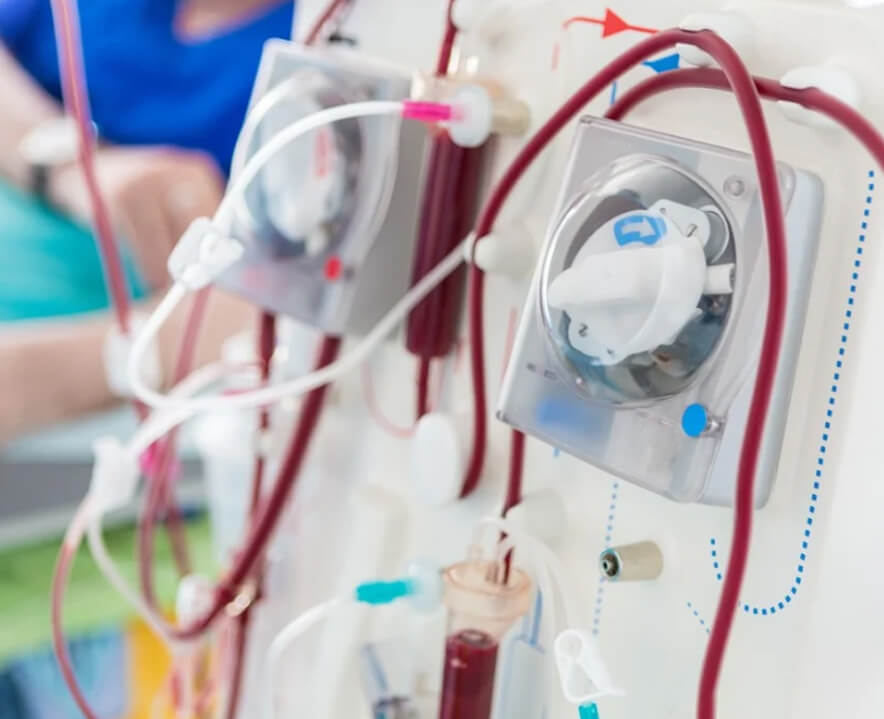About Blue Bliss Dialysis Centre, Bangalore
Living with kidney disease and going for regular dialysis can be hard. It can make you feel tired, stressed, and can affect your daily life. At Blue Bliss Dialysis Center in Bangalore, we understand how difficult this can be for both patients and their families.
We’ve made our dialysis center a safe and caring place where you can feel comfortable. But we don’t just treat the disease. We care about you—your body, mind, and emotions.
We take time to get to know each person, listen to what they need, and make a care plan that fits them best.
This is how we provide care for our patients:
-
24/7 Monitoring and Care
Our expert staff is on duty 24/7 to keep patients safe, comfortable, and well cared for.
-
Daily Activity Support
We help with daily activities so patients can stay as independent and active as they wish.
-
Nutrition Support
Our dietitians prepare healthy, delicious meals that support the kidneys and the overall health of patients.
-
Medication Support
We educate patients on appropriate and safe management of medication and monitor for side effects.
-
Physical Therapy
Exercise and movement programs are created gradually to maintain our patients as strong, flexible, and active as possible.
-
Support for Families
We realize that it affects the whole family, and that's why we provide counselling, support, and listen to their needs.
You're not just another patient at Blue Bliss Dialysis Center, you're family. We're here to simplify this, make it healthier and more positive for all.
Need for Dialysis
A healthy kidney prevents extra water, impurities ad other wastes from accumulating in the human
body. It also regulates levels of chemical elements in the blood which includes sodium,
potassium and control blood pressure level. It also improves the calcium absorption by
activating a form of vitamin-D. When the kidneys don’t function normally due to damage or
disease, salts and other wastes can accumulate in the blood, poison the body and damage other
organs.
Types of Dialysis
There are 3 types of dialysis that a nephrologist suggests depending upon the condition of the
patient.
-
Hemodialysis : This is the most common form of dialysis which uses a device called
hemodialysis which works like an artificial kidney and removes wastes and extra fluid. The
process involves removing the blood from the body, purifying it with artificial kidneys in
returning the filtered blood into the body through the dialysis machine.
To get the blood flowing into the artificial kidney, the doctor creates vascular access
through surgery. These entrance point into blood vessels can be any of the three types: the
arteriovenous fistula that connects an artery and a vein, the av graft which is a looped
tube or the vascular access catheter that is inserted into a large vein in the neck.
-
Peritoneal dialysis is the process that involves implantation of the peritoneal
dialysis catheter in the abdomen which filters blood through an abdominal membrane called
the peritoneum. During the procedure, a specific fluid flows into the peritoneum called the
dialysate. Dialysate absorbs he waste and once the same is drawn out of the bloodstream. It
is drained out of the abdomen. The procedure takes place 4 to 6 times a day and takes a few
hours to be completed.
-
Continuous renal replacement therapy is primarily used for people with acute kidney
failure. This process, also called hemofiltration involves a machine that allies the blood
to pass through a tubing. Thereafter a filter removes the wastages from the blood and the
blood is returned to the body together with some replacement fluid. The procedure takes 12
to 24 hours and is generally performed every day.
Preparing for Dialysis
Before the first dialysis session takes place, the doctor conducts a small surgical procedure to
gain access to the bloodstream by implanting a tube or a device. The patient is usually allowed
to return the same day. Other pre-dialysis tips would include wearing comfortable and loose
clothes, strictly following doctors instructions as it could include fasting for a certain span
of time.
Why choose Blue Bliss
Hospital
Blue bliss hospital has a team of expert nephrologists with years of experience in treating
kidney diseases and conducting dialysis flawlessly. Each of the doctors and the medical support
staff are committed to delivering the best blend of care, cure and cost to our patients.
The instruments and equipment used for dialysis are technologically optimised and are regularly
reviewed for safety and cleanliness standards. Every dialysis procedure is conducted in a
patient-centric approach considering the physical, mental and emotional wellbeing of the
patient.
Blue Bliss Hospital is located in Seshadripuram, Bengaluru and is at a walking distance to Mantri
Square Sampige Road, malleshwaram. Blue Bliss Hospital is one of the best Dialysis Centers in Bangalore. It has 7 General Dialysis including 1 CRRT machine.
